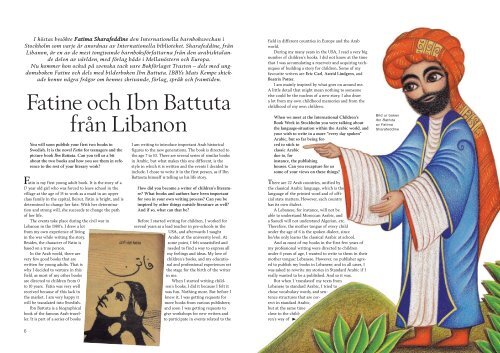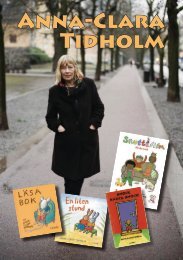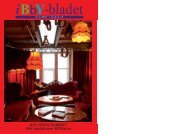PETER PAN-PRISET till Ho Baek Lee och Ensam ... - IBBY Sverige
PETER PAN-PRISET till Ho Baek Lee och Ensam ... - IBBY Sverige
PETER PAN-PRISET till Ho Baek Lee och Ensam ... - IBBY Sverige
Create successful ePaper yourself
Turn your PDF publications into a flip-book with our unique Google optimized e-Paper software.
I höstas besökte Fatima Sharafeddine den Internationella barnboksveckan i<br />
Stockholm som varje år anordnas av Internationella biblioteket. Sharafeddine, från<br />
Libanon, är en av de mest tongivande barnboksförfattarna från den arabisktalande<br />
delen av världen, med förlag både i Mellanöstern <strong>och</strong> Europa.<br />
Nu kommer hon också på svenska tack vare Bokförlaget Trasten – dels med ungdomsboken<br />
Fatine <strong>och</strong> dels med bilderboken Ibn Battuta. <strong>IBBY</strong>s Mats Kempe skickade<br />
henne några frågor om hennes skrivande, förlag, språk <strong>och</strong> framtiden.<br />
6<br />
Fatine <strong>och</strong> Ibn Battuta<br />
från Libanon<br />
You will soon publish your first two books in<br />
Swedish. It is the novel Fatin for teenagers and the<br />
picture book Ibn Battuta. Can you tell us a bit<br />
about the two books and how you see them in reference<br />
to the rest of your literary work?<br />
Fatin is my first young adult book. It is the story of a<br />
17 year old girl who was forced to leave school in the<br />
village at the age of 15 to work as a maid in an upper<br />
class family in the capital, Beirut. Fatin is bright, and is<br />
determined to change her fate. With her determination<br />
and strong will, she succeeds to change the path<br />
of her life.<br />
The events take place during the civil war in<br />
Lebanon in the 1980’s. I drew a lot<br />
from my own experience of living<br />
in the war while writing the story.<br />
Besides, the character of Fatin is<br />
based on a true person.<br />
In the Arab world, there are<br />
very few good books that are<br />
written for young adults. That is<br />
why I decided to venture in this<br />
field, as most of my other books<br />
are directed to children from 0<br />
to 10 years. Fatin was very well<br />
received because of this lack in<br />
the market. I am very happy it<br />
will be translated into Swedish.<br />
Ibn Battuta is a biographical<br />
book of the famous Arab traveller.<br />
It is part of a series of books<br />
I am writing to introduce important Arab historical<br />
figures to the new generations. The book is directed to<br />
the age 7 to 10. There are several series of similar books<br />
in Arabic, but what makes this one different, is the<br />
style in which it is written and the events I decided to<br />
include. I chose to write it in the first person, as if Ibn<br />
Battouta himself is telling us his life story.<br />
<strong>Ho</strong>w did you become a writer of children’s literature?<br />
What books and authors have been important<br />
for you in your own writing process? Can you be<br />
inspired by other things outside literature as well?<br />
And if so, what can that be?<br />
Before I started writing for children, I worked for<br />
several years as a lead teacher in pre-schools in the<br />
USA, and afterwards I taught<br />
Arabic at the university level. At<br />
some point, I felt unsatisfied and<br />
needed to find a way to express all<br />
my feelings and ideas. My love of<br />
children’s books, and my educational<br />
and professional experiences set<br />
the stage for the birth of the writer<br />
in me.<br />
When I started writing children’s<br />
books, I did it because I felt it<br />
was fun. Nothing more. But before I<br />
knew it, I was getting requests for<br />
more books from various publishers;<br />
and soon I was getting requests to<br />
give workshops for new writers and<br />
to participate in events related to the<br />
field in different countries in Europe and the Arab<br />
world.<br />
During my many years in the USA, I read a very big<br />
number of children’s books. I did not know at the time<br />
that I was accumulating a reservoir and acquiring techniques<br />
of building a story for children. Some of my<br />
favourite writers are Eric Carl, Astrid Lindgren, and<br />
Beatrix Potter.<br />
I am mainly inspired by what goes on around me.<br />
A little detail that might mean nothing to someone<br />
else could be the nucleus of a new story. I also draw<br />
a lot from my own childhood memories and from the<br />
childhood of my own children.<br />
When we meet at the International Children’s<br />
Book Week in Stockholm you were talking about<br />
the language-situation within the Arabic world, and<br />
your wish to write in a more ”every day spoken”<br />
Arabic, but so far being forced<br />
to stick to<br />
classic Arabic<br />
due to, for<br />
instance, the publishing<br />
houses. Can you recapture for us<br />
some of your views on these things?<br />
There are 22 Arab countries, unified by<br />
the classical Arabic language, which is the<br />
language of the printed word and of official<br />
state matters. <strong>Ho</strong>wever, each country<br />
has its own dialect.<br />
A Lebanese, for instance, will not be<br />
able to understand Moroccan Arabic, and<br />
a Saoudi will not understand Algerian, etc.<br />
Therefore, the mother tongue of every child<br />
under the age of 6 is the spoken dialect, since<br />
he/she only learns the classical Arabic at school.<br />
And as most of my books in the first few years of<br />
my professional writing were directed to children<br />
under 6 years of age, I wanted to write to them in their<br />
mother tongue: Lebanese. <strong>Ho</strong>wever, no publisher agreed<br />
to publish my books in Lebanese; and in all cases, I<br />
was asked to rewrite my stories in Standard Arabic if I<br />
really wanted to be a published. And so it was.<br />
But when I ‘translated’ my texts from<br />
Lebanese to standard Arabic, I tried to<br />
chose vocabulary words, and sentence<br />
structures that are correct<br />
in standard Arabic,<br />
but at the same time<br />
close to the children’s<br />
way of<br />
Bild ur boken<br />
Ibn Battuta<br />
av Fatima<br />
Sharafeddine




